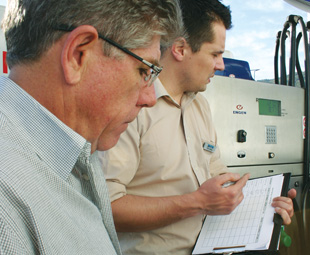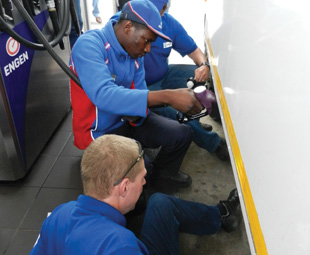Fu(e)ll throttle

The Truck Test programme has partnered with Engen (which has sponsored fuel for all the vehicles and participants during the past three events) since its inception … And, if you look at what the company has to offer, it is easy to understand why.
Engen, a major supplier of fuels and lubricants to the road transport industry, has built up a winning track record through its ongoing commitment to enhance service delivery. This has led to the company being crowned a market leader within the petroleum industry. But you don’t just acquire such a title; you have to work for it – which Engen has certainly done.
The company has pioneered methods of controlling the cost and procurement of fuel, as the price of diesel and the cost of diesel theft are top-of-mind issues for most fleet and commercial-vehicle operators.
Proof of this is the Engen Diesel Club (EDC), which was first launched in the 1980s and locally introduced in 1995. “EDC has been specifically designed to create a fuel-management and control solution for fleet managers, to assist with combating fuel theft and fraud, the supply of accurate and timely fleet reports and, ultimately, helping to lower fuel costs,” explains Lindsay Bassett, Engen’s key account manager: Transport – Commercial Fuels.
 EDC provides its clients with two individual solutions: The EDC swipe card, which facilitates cashless refuelling; and eFuel, an electronic fuel-dispensing system, which combats fraud and offers fleet managers complete control over their vehicles. Both the EDC Magstripe card and eFuel Tag provide a simple and secure, cashless refuelling solution, which is available twenty-four hours a day, seven days a week and is backed by comprehensive reporting functionality.
EDC provides its clients with two individual solutions: The EDC swipe card, which facilitates cashless refuelling; and eFuel, an electronic fuel-dispensing system, which combats fraud and offers fleet managers complete control over their vehicles. Both the EDC Magstripe card and eFuel Tag provide a simple and secure, cashless refuelling solution, which is available twenty-four hours a day, seven days a week and is backed by comprehensive reporting functionality.
The eFuel technology confirms that the right vehicle is being filled with no human intervention, cash or cards. “The vehicle itself (and not the driver) is the method of paying for and authorising the transaction,” Bassett points out. “The pump will not switch on unless authorised by an eFuel-equipped vehicle,” he reiterates.
During refuelling, automatic readings of the odometer, vehicle, fuel type, transaction volume and value are also recorded, requiring no manual data input. “This fully automated process prevents intentional manipulation or accidental error, giving customers greater control over their fuel spend. It provides ‘peace-of-mind’ that only authorised vehicles can procure fuel,” Bassett explains.
Additional benefits include: reports on fuel consumption to fleet managers, where any exceptions are flagged; proactive maintenance services, whereby vehicles are maintained, based on the findings from fuel-management reports or any faults logged by the client; an eFuel 24-hour helpdesk to assist with any problems that may occur during the refuelling process; and a dedicated account management and client-liaison function to ensure that all the services are carried out effectively.
But, as with most things in life, there is always room for improvement – which Engen has fully embraced. The company has recently upgraded its eFuel offering with some wireless capabilities – reducing the system’s installation and support costs at stations and in vehicles. Commercial vehicle operators can now access all that the EDC eFuel technology has to offer with no “strings” attached (so to speak) and it’s easier for more stations to implement the technology.
The new eFuel Wireless system is also backwardly compatible to support the existing Vehicle Identification Units and station-automation systems. “Engen’s Truck Stops, and a number of trial customers’ fleets, are currently being fitted with the wireless technology,” Bassett points out. “And, with a network of 400 existing eFuel sites and nearly 4 000 eFuel-fitted vehicles, the rate of conversion will be carefully managed and, undoubtedly, appreciated by all users of the technology.”
He continues: “Like its predecessor, eFuel Wireless will continue to increase revenues, reduce maintenance costs and enhance security, as it proves to be a ‘peace-of-mind’ solution to the ongoing problems facing diesel and cost control.”
So, it is easy to understand why the Truck Test programme has partnered with Engen (which has generously sponsored the fuel for all the vehicles and various meals for the participants during the past three events) since its inception … The company continues to enhance its service delivery and improves its channels of communication, between the commercial vehicle sector and Engen, to ensure the wheels of industry, and the Truck Test programme, keep on rolling …
 But why did Engen decide to join the partnership? “As the major supplier of fuel to the South African transport industry, we are acutely aware of the increasingly difficult operating conditions that the industry faces,” Bassett points out. “Escalating fuel prices, toll roads, crime, labour issues and a slow economy all contribute to a very tough operating environment.”
But why did Engen decide to join the partnership? “As the major supplier of fuel to the South African transport industry, we are acutely aware of the increasingly difficult operating conditions that the industry faces,” Bassett points out. “Escalating fuel prices, toll roads, crime, labour issues and a slow economy all contribute to a very tough operating environment.”
He adds that transport operators can make more informed decisions about which vehicles to use on specific routes, or applications, as well as determine the true costs of certain contracts with the data provided through Truck Test. “This, of course, enables the transport operator to determine rates more accurately, improving the chances of successfully negotiating contracts and running them profitably.”
Bassett continues: “Engen sees its support as a responsibility to the industry and its customer base that have demonstrated great loyalty to Engen over many years. Truck Test also provides Engen with an opportunity to showcase some of its Truck Stop and One-Stop facilities, which are designed around meeting the needs of the country’s truckers out on the road.”
So, according to Bassett, having been involved in the 2012 and 2013 event and having seen the positive response from Engen’s major transport customers (and knowing the benefits that the collection of the data has to the road-freight industry) the company had no hesitation in offering its sponsorship and participation in Truck Test 2014. “The concept, now in its third year, has really caught on and remains an important event on Engen’s calendar.”
However, this year’s event was slightly low key compared to previous Truck Tests, due to the category of vehicles selected (comprising 4×2 units with a gross vehicle mass of between five and nine tonnes), notes Bassett.
This smaller category of vehicles, tested in Truck Test 2014, also doesn’t account for a large percentage of fuel usage within Engen’s commercial customer base. “Engen’s primary business is the production and marketing of fuels and lubricants, so the greater the burn of fuel, the happier we are,” says Bassett. “So, large transport operators, running fleets of truck tractors, are our target market in the transport sector,” he explains.
“However, the high number of two to eight tonners, undertaking local distribution, does need to be provided for and, for that reason, we are happy that Truck Test 2014 focused on this segment of the trucking market.”
Bassett adds that the slickness of the organisation, which he credits to the teams at FOCUS, Hellberg Transport Management, Ctrack and Engen, was once again a highlight for him. “Of course the esprit de corps among participants is also something that is fascinating to watch,” he points out. “Engen would certainly like to be involved again next year. We hope to meet with the organisers soon to discuss the concept and vehicle categories for Truck Test 2015.”
With Engen’s EDC eFuel Wireless technology, and the ability to accurately calculate actual operating costs on a proposed contract, through data collected from Truck Test, the South African transport industry is further enabled to reach greater efficiencies … A great benefit to the country’s economy and to our international reputation as a truly emerging market.
Published by
Focus on Transport
focusmagsa




